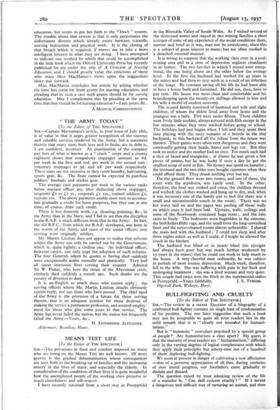" THE ARMY TODAY " [To the Editor of THE
SPECTATOR.] SIR,—Captain Macnamara's article, in your issue of July 16th, is of value in that it urges greater recognition of the onerous and valuable services rendered by the Army, but a statement therein that many men, both here and in India, are in debt is, I am confident, incorrect. An examination of the company .pay lists of what is known as a " crack " corps and a county regiment shows that compulsory stoppages amount to 6d. per week in the first and rod. per week in the second unit : voluntary stoppages to 3d. and rd. per week respectively. These sums are not excessive as they cover laundry, haircutting, sports gear, &c. The State cannot be expected to purchase soldiers' footballs and cricket gear.
The average cash payments per week to the various ranks below warrant officer are, after deducting above stoppages, sergeanti £2 to £2 5s., corporals £r los., trained soldiers Li, recruits vas. The above payments enable most men to accumu- late gradually a credit for leave purposes, but they can at any time, of course, draw such credit.
There is less domestic work, e.g. cleaning, painting, &c., in the Army than in the Navy, and I fail to see that the discipline in the R.A.F. is much different from that in the Army. In fact, the old R.F.C., from which the R.A.F. developed, was born in the womb of the Army, and most of the senior officers now serving were originally soldiers.
Mr. Martin Lindsay does not appear to realise that reforms within the Army can only be carried out by the Government, which is, quite rightly, a civilian one. An individual officer, however senior, can only urge the adoption of such reforms. The four Generals whom he quotes as having died suddenly were exceptionally active mentally and physically. They had all spent strenuous lives serving their country. Admiral Sir W. Fisher, who bore the strain of the Abyssinian crisis, similarly died suddenly a month ago. Such deaths are the penalty of devotion to duty.
It is un-English to attack those who cannot reply ; the serving officers whom Mr. Martin Lindsay attacks obviously cannot reply, nor can those who have passed. The chief need of the Army is the provision of a future for those serving therein, that is an adequate pension for those desirous of making the service a permanent profession, and assured employ- ment for those who give some years to that service. The Army has never failed the nation, but the nation has frequently failed the Army.—Yours, &c.,






































 Previous page
Previous page